- Serbia
Get to know Serbia
- Citizens
Culture and science
Health services
Pension and disability insurance
- Business
Employment
Economy
- Media
- Government
- Contact
Keep in touch
Contact form
Back
Keepin touch
Whether you have a question, comment, suggestion or any problem in the purview of the government, send us your message and we will try to respond as soon as possible. If your problem is not in our purview, we will forward your message to the relevant institution.
Q:
A:
Conference on Serbia's judicial reform strategy opens in Belgrade
Belgrade,
6 October 2004
Serbian Minister of Justice Zoran Stojkovic opened a two-day conference addressing a strategy for Serbia's judicial reform in Belgrade today. The conference was organised by the Ministry of Justice, in cooperation with the World Bank office in Serbia-Montenegro.
Speaking to participants in the conference, Stojkovic said that the judicial reform commission is drafting a set of 24 judiciary-related laws. The commission has also set deadlines for its short-term goals until 2006 and mid-term goals until 2008, Stojkovic added.
It has prepared a series of projects concerning judicial regulations and set tasks regarding the provision of computer equipment for local courts and their connection through a computer network, the Minister noted.
Judicial employee education and training is also high on the judicial reform priority agenda, Stojkovic went on to say, adding that the existing judicial centre is to be transformed into a judicial academy that will resemble those of France and Germany.
Stojkovic said that those who supported reform processes are expected to provide professional, financial and organisational assistance in the judicial reform process as well. He also said that after the Justice Ministry’s team in charge of strategy coordination receives approval from the government, it will have full legitimacy to suggest priority objectives.
Noting that the rule of law is the main driving force behind economic growth, World Bank Country Manager for Serbia-Montenegro Carolyn Jungr said that the bank is ready to cooperate with donors and help Serbia build a strong judicial system.
According to her, judicial reform is a basic precondition for strengthening democracy, establishing transparency and efficiency, enforcing laws, resolving conflicts, establishing coexistence and fighting corruption.
Council of Europe Director of Legal Cooperation Roberto Lamponi announced that the Serbian Ministry of Justice and the Council of Europe will sign a protocol on cooperation this week, noting that the document will help Serbia harmonise its judicial reform with key priorities of judicial reforms in Council of Europe programmes.
OSCE Mission to Serbia-Montenegro Head Maurizio Massari stressed that the rule of law is a precondition for the fight against organised crime and corruption, human rights protection, democracy and economic growth. He also noted that judicial bodies must be independent, free from political interference and compatible with European and international standards.
According to Massari, an independent and fully functioning judiciary, which is in the national interest of Serbia, calls for patience, political will and consensus among all political parties.
He also called on the international community to assist Serbia's judicial reform efforts and improve cooperation with the Serbian Ministry of Justice.
Prime Minister Vojislav Kostunica also sent a telegram to the organisers of the conference voicing hope that the conference will be an important contribution for harmonising Serbia’s legal institutions with European and international standards.
It has prepared a series of projects concerning judicial regulations and set tasks regarding the provision of computer equipment for local courts and their connection through a computer network, the Minister noted.
Judicial employee education and training is also high on the judicial reform priority agenda, Stojkovic went on to say, adding that the existing judicial centre is to be transformed into a judicial academy that will resemble those of France and Germany.
Stojkovic said that those who supported reform processes are expected to provide professional, financial and organisational assistance in the judicial reform process as well. He also said that after the Justice Ministry’s team in charge of strategy coordination receives approval from the government, it will have full legitimacy to suggest priority objectives.
Noting that the rule of law is the main driving force behind economic growth, World Bank Country Manager for Serbia-Montenegro Carolyn Jungr said that the bank is ready to cooperate with donors and help Serbia build a strong judicial system.
According to her, judicial reform is a basic precondition for strengthening democracy, establishing transparency and efficiency, enforcing laws, resolving conflicts, establishing coexistence and fighting corruption.
Council of Europe Director of Legal Cooperation Roberto Lamponi announced that the Serbian Ministry of Justice and the Council of Europe will sign a protocol on cooperation this week, noting that the document will help Serbia harmonise its judicial reform with key priorities of judicial reforms in Council of Europe programmes.
OSCE Mission to Serbia-Montenegro Head Maurizio Massari stressed that the rule of law is a precondition for the fight against organised crime and corruption, human rights protection, democracy and economic growth. He also noted that judicial bodies must be independent, free from political interference and compatible with European and international standards.
According to Massari, an independent and fully functioning judiciary, which is in the national interest of Serbia, calls for patience, political will and consensus among all political parties.
He also called on the international community to assist Serbia's judicial reform efforts and improve cooperation with the Serbian Ministry of Justice.
Prime Minister Vojislav Kostunica also sent a telegram to the organisers of the conference voicing hope that the conference will be an important contribution for harmonising Serbia’s legal institutions with European and international standards.
-
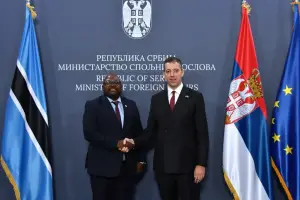 Belgrade, 21 November 2025
Belgrade, 21 November 2025Joint commitment to strengthen bilateral ties between Serbia, Botswana
-
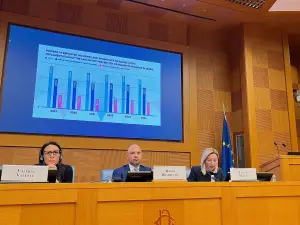 Belgrade/Rome, 21 November 2025
Belgrade/Rome, 21 November 2025Serbian government’s strong commitment to combating violence against women
-
 Belgrade, 18 November 2025
Belgrade, 18 November 2025Serbia remains committed to open dialogue, cooperation with OSCE
-
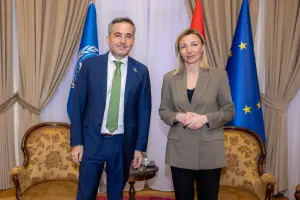 Belgrade, 18 November 2025
Belgrade, 18 November 2025Cooperation with WHO to strengthen protection for victims of violence
-
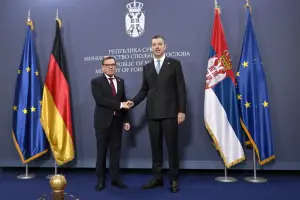 Belgrade, 18 November 2025
Belgrade, 18 November 2025Germany ready to accompany Serbia on its path towards EU
-
 Belgrade, 16 November 2025
Belgrade, 16 November 2025Solution for NIS must be found by next week
-
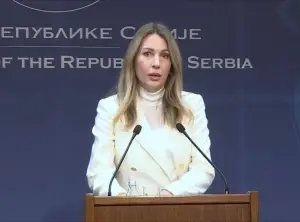 Belgrade, 15 November 2025
Belgrade, 15 November 2025United States sends request for Russian ownership to exit NIS
-
 Belgrade, 13 November 2025
Belgrade, 13 November 2025Serbia continues to be reliable partner of EU
-
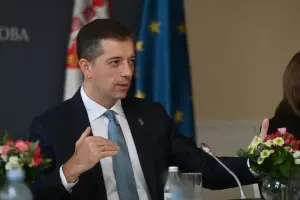 Belgrade, 13 November 2025
Belgrade, 13 November 2025European integration, preserving peace, stability priorities for Serbia
-
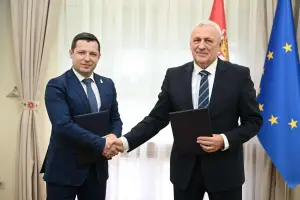 Belgrade, 13 November 2025
Belgrade, 13 November 2025Cooperation agreement signed for preparation of Specialised Expo 2027


